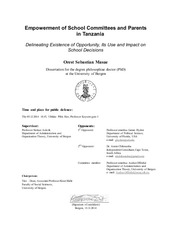| dc.description.abstract | Since the end of the twentieth century, public administration systems in developing countries have undergone significant transformation. This comes as a result of the global shift from centralized to decentralized political, fiscal and administrative systems. Through such transformation, governments seek to empower people at the grassroots level and to improve service delivery in all sectors. This dissertation examines the empowerment of school committees and parents in school governance, focusing on the sub-sector of primary education in Tanzania. In particular, it accomplishes three key goals: First, it delineates the empowerment of school committees and parents using Alsop and Heinsohn’s (2005) and Alsop et al.s’ (2006) three-level framework for measuring empowerment. The three levels are the Degree of Existence of Opportunity (DEO) for people at the grassroots level to participate in decision making, the Degree of Use of the Opportunity (DUO) and the Degree Of Impact (DOI) that the use of opportunity has on the decisions made by a school. Second, the dissertation determines factors affecting the empowerment of school committees in Tanzania. As for the third goal, the dissertation suggests important policy issues to be addressed for increasing the empowerment of people at the grassroots level in school governance. The study from which this work is written was carried out in 2012 and 2013 in seven purposefully selected districts/municipalities in Tanzania. The study employed a mixed methods approach. 214 members of school committees and 96 non-members from 101 schools answered a survey questionnaire. Additionally, 17 in-depth interviews with education officials, teachers and parents were conducted. As a follow-up to the emerging issues from the survey, the study also involved two focus-group discussions (one each) with parents and members of school committees. The survey data were analysed quantitatively through the comparison of means, independent sample t-tests, correlation analysis and multiple-linear regression analysis, all of which are presented in the dissertation mainly through tabulation. The data from interviews and focus groups were analysed through content analysis and are presented here in narrative form. | en_US |
